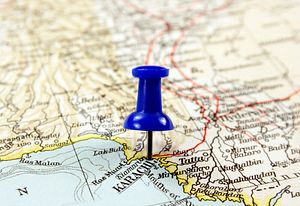A heat wave over the weekend in southern Pakistan has resulted in the deaths of more than 600 people, according to a senior Pakistani health official. The heat wave has been accompanied by power cuts, yielding fans and air conditioners useless. It also comes during the first weeks of Ramadan, the Muslim holy month in which the devout fast during daylight hours. Many also abstain from drinking water while fasting as well.
May and June are typically the hottest months in the region before the monsoon season dampens the heat. Average highs in Karachi in June are historically around 94.6°F (34.8°C), but over the weekend temperatures in Pakistan’s largest city reached 113°F (45°C). The hottest temperature ever recording in Karachi was 118.04°F (47.8°C) in May 1938, according to the Pakistan Meteorological Department. The heat wave extends beyond Sindh province, though the massive size of Karachi makes it the site of most of the deaths reported. PMD noted on its website ticker that the city of Turbat, which is in southwestern Pakistan towards the Iranian border, would reach 120.2°F (49°C) today.
According to the BBC, on Tuesday the National Disaster Management Authority (NDMA) said it was given orders by Pakistan’s Prime Minister Nawaz Sharif to “take immediate action to tackle the crisis.” The army has been called in to set up heat stroke treatment centers. Shahzeb Jillani, a BBC correspondent, reported that sporadic protests have taken place across Karachi and that the government and the city’s main utility company, K-Electric, are being blamed for not anticipating this crisis and acting too late.
In Islamabad, opposition politicians have begun to point fingers as well. In a statement Imran Khan, leader of the Movement for Justice party said that “The situation in Karachi is one of chaos and lawlessness with no visible writ of the government…The people of Karachi have been effectively abandoned by the provincial and federal governments, both of whom have failed to provide the basic necessities of life.”
“The government has not lived up to its responsibility,” said Khurshid Shah, a leader of the Pakistan Peoples party. Sindh province is the Pakistan People’s Party’s stronghold.
According to the Financial Times, opposition politicians have scheduled a day of protests for Friday.
A convergence of several problems has contributed to the deaths in Pakistan. Globally, temperatures are on the rise, as are instances of extreme weather. 2014 was the hottest year on record. Additionally Pakistan suffers from critical infrastructure failures–the result of poor governance, poor construction, and poor planning. Shafqat Kakakhel, a former Pakistani diplomat who served at the UN Environment Program in Nairobi was quoted by the Financial Times as saying that “Population increase as well as irregular and chaotic urbanisation in Pakistan has added to the stress…If people in Karachi had better access to electricity there would have been fewer casualties.”
Sharif has been sharply criticized for the inability of his administration to solve the electricity crisis. The New York Times reported in February that heavy rationing in some rural areas has resulted in as little as four hours of electricity a day. In Karachi, cuts of up to 10 hours, reported by the Financial Times, certainly played a role in a rising death toll.
Beyond its chronic electricity shortfalls, Pakistan also faces a looming water crisis.
While temperatures are expected to come down toward the end of the week, when rain is predicted, the death toll is expected to rise until then. In May, India experienced one of the worst heat waves in its history. The death toll was above 2,300 by the end of the month.

































